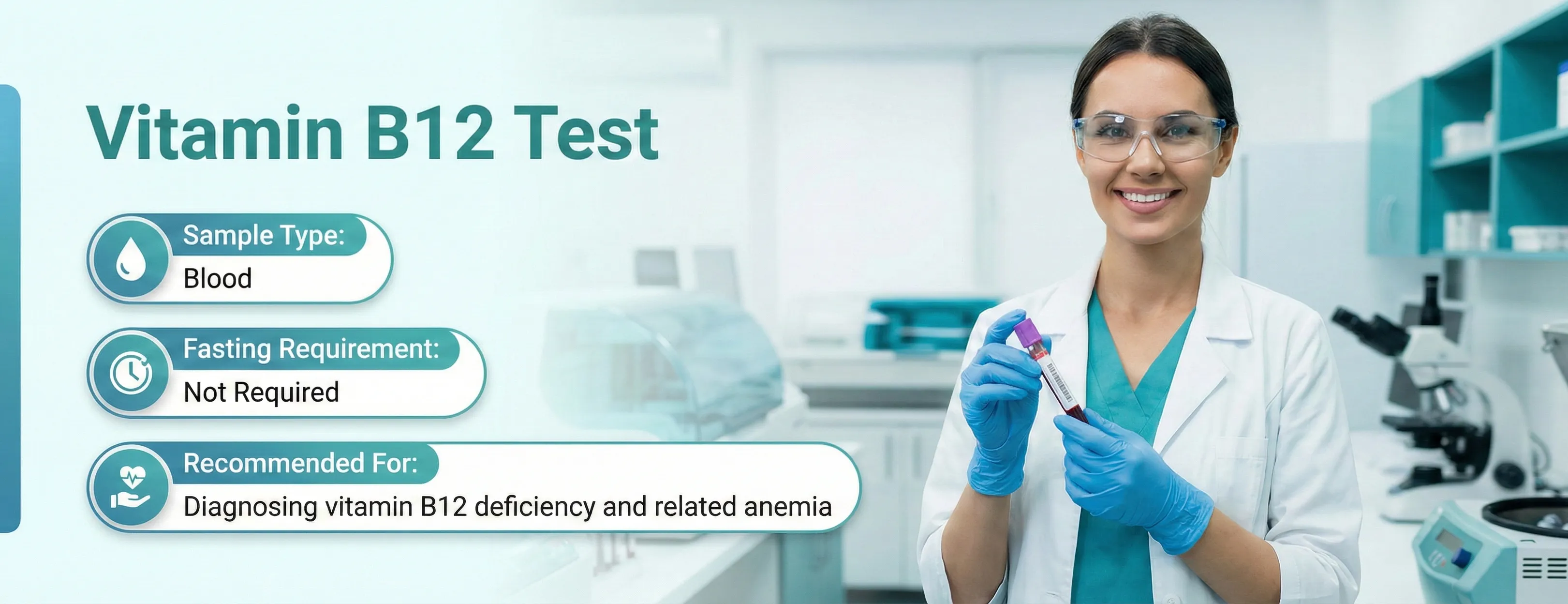1718+ orders placed in your location
100% NABL & ISO Certified Lab • 100% Accurate Reports
Vitamin B12 Test
Cobalamin test, Cyanocobalamin test, Methylcobalamin test
- SummaryThe Vitamin B12 Test measures the level of vitamin B12 in your blood. Vitamin B12 which is essential for nerve function, red blood cell production, and DNA synthesis. A deficiency can lead to fatigue, weakness, neuropathy, or anaemia. This test uses a blood sample, requires no fasting, and can be taken by individuals of any age as advised by a healthcare provider.Read more
- Reports Within15 HrsView Sample Report100% NABL & ISO Certified Labs
- SampleBlood
- AgeAll Age Group
- GenderMale and Female
- FastingNot Required
PharmEasy Promises
Know More About The Test
A quick info on Vitamin B12 Test
Overview
The Vitamin B12 Test is a serological test used to measure the levels of vitamin B12 in your blood. Your body needs Vitamin B12 to make blood cells and ensure the proper functioning of the brain and nervous system. Vitamin B12 deficiency results in the reduction of red blood cells, which is known as pernicious anaemia or megaloblastic anaemia.
Vitamin B12 is a water-soluble vitamin needed by your body to keep your blood and nerve cells healthy. Vitamin B12 also helps make the genetic material in your cells known as DNA.
The Vitamin B12 Test is prescribed as a diagnostic test for macrocytic anaemia and megaloblastic anaemia or pernicious anaemia. For people whose regular reports show signs of these types of anaemias, the Vitamin B12 Test helps confirm the diagnosis.
Pernicious anaemia or megaloblastic anaemia may be caused due to poor absorption of vitamin B12 from your intestines.
Macrocytic anaemia is a condition where your body’s red blood cells are overly large and there is a decrease in the total number of normal red blood cells.
Studies show that vitamin B12 deficiency is an endemic condition in Indians. 47% of Indians suffer from this deficiency.
To manage your daily requirement of vitamin B12 levels, you can include meats, dairy and seafood in your diet. For example, eat more liver, pork, beef, fortified soymilk, fish, chicken, poultry and dairy products like milk, yoghurt and cheese. These foods will help maintain your body’s daily requirement of vitamin B12.
Sample Type
The Vitamin B12 Test is done by taking your blood sample. You can get this test done along with your regular tests or as a single blood test.
Risk Assessment
Megaloblastic Anaemia or Pernicious Anaemia, Macrocytic Anaemia
What does this test detect?
The Vitamin B12 test detects the levels of the water-soluble vitamin B12 in your body. Vitamin B12 is a water-soluble vitamin needed for the proper functioning of your blood cells and nerve cells. In the absence of vitamin B12, your red blood cells stop functioning normally and you suffer from anaemia. The nerve cells also work abnormally, resulting in nervous system-related symptoms like tingling numbness, confusion and brain fag.
Vitamin B12 and folate are the two vitamins that form a part of the vitamin B complex. Vitamin B12 and folate work in tandem with vitamin C to make new proteins in your body. These are necessary for the formation of normal red blood cells and white blood cells, tissue and cell repair and the formation of DNA.
The Vitamin B12 test is generally advised for the following category of people -
- Older adults
- Children
- Strict vegetarians
- People with diabetes
- Vegans
- People who have recently undergone gastric bypass surgery
- Pregnant women
- Breastfeeding mothers
Indications for Vitamin B12 Test
The Vitamin B12 Test is prescribed for all age groups and genders. It is advised to people who experience the following symptoms -
- Weakness
- Loss of balance
- Tingling and/or numbness of hands and feet
- Loss of brain function
- Tingling of the scalp
- Oral ulcers
- Disturbed vision
- Issues with memory, learning, understanding and judgement
- Muscle weakness
- Depression
- Confusion
- Sore and red tongue
Since vitamin B12 is a water-soluble vitamin that is mainly present in animal sources, there are a specific set of strictly veg people who are at risk of developing vitamin B12 deficiency.
How frequently should you take this test?
Depending on your health condition and the prognosis, you may have to repeat the test. Your doctor will ask you to repeat it every 3-6 months based on your symptoms. The treatment and dosage will be changed accordingly.
Test Preparation
The Vitamin B12 test requires you to give a blood sample for testing. There is no special preparation needed for this test.
Before the Test
This test does not require any preparation from your end. Inform your physician if you are on any medicines that may or may not affect your vitamin B12 levels.
Some medicines that affect your Vitamin B12 Test results are
- Colchicine
- Phenytoin
- Para-aminosalicylic acid
- Neomycin
During the Test
It is a simple blood test that will take about 5-10 minutes. You do not need to prepare for the test in any way.
After the Test
There are no restrictions after the Vitamin B12 Test. You can resume your regular activity.
Parameters
The Vitamin B12 Test report includes only the levels of vitamin B12 in your body.
Ranges
Vitamin B12 Test results shows the levels of Vitamin B12 present in your blood. The normal Vitamin B12 range in the body is 239-931 pg/ml
The normal values and reference range of tests may vary from lab to lab. Please consult your doctor to understand the interpretation of your lab reports.
Test Result Interpretation
The Vitamin B12 Test results will suggest whether you have low levels of the vitamin or high levels.
If your vitamin B12 levels are low, it indicates that you have vitamin B12 deficiency.
Causes of Vitamin B12 deficiency include:
- Not enough vitamin B12 intake in the diet. This could be either due to not eating enough meat or if you are a vegetarian.
- Lack of the intrinsic factor, a protein that is required by the intestines to absorb vitamin B12.
- Diseases that lead to malabsorption like coeliac disease, Crohn’s disease.
- Excessive heat production in the body due to hyperthyroidism.
- Pregnancy.
Increased levels of vitamin B12 in the Vitamin B12 Test report are rare as excess vitamin B12 is removed from the body via urine. Vitamin B12 is a water-soluble vitamin.
However, conditions that can cause a rise in the B12 levels include:
- Liver diseases like cirrhosis or hepatitis.
- Myeloproliferative disorders like polycythaemia vera, chronic myelogenous leukaemia.
- High intake of Vitamin A.
- High intake of Vitamin C.
- Intake of oestrogens.
Some medicines affect the levels of vitamin B12 in your body like
- Chloramphenicol or chloromycetin used as an antibiotic.
- Proton pump inhibitors are used for acidity and gastritis.
- H2 receptor blockers are used for acidity and gastritis.
- Metformin is used for diabetes.
If you have been diagnosed with vitamin B12 deficiency on the VitaminB12 test results, your doctor will advise the following treatment protocol:
- Vitamin B12 injections for severe deficiencies.
- Oral supplements of cyanocobalamin (a synthetic form of vitamin B12) are to be taken daily.
- Following a diet rich in vitamin B12 that includes meat, seafood and dairy products.
Price/Cost
Depending on the city and the lab, the cost of a Vitamin B12 test can differ. Generally, the price for a Vitamin B12 test ranges from INR 365 to INR 1265. Here's a detailed breakdown of the average expenses for a Vitamin B12 test in several key cities in India:
City | Min Price | Average Price | Max Price |
Vitamin B12 Test Price in Bengaluru | 365 | 815 | 1265 |
Vitamin B12 Test Price in Chennai | 365 | 815 | 1265 |
Vitamin B12 Test Price in Delhi | 365 | 815 | 1265 |
Vitamin B12 Test Price in Hyderabad | 365 | 815 | 1265 |
Vitamin B12 Test Price in Kolkata | 365 | 815 | 1265 |
Vitamin B12 Test Price in Lucknow | 365 | 815 | 1265 |
Vitamin B12 Test Price in Mumbai | 365 | 815 | 1265 |
Vitamin B12 Test Price in Nagpur | 365 | 815 | 1265 |
Vitamin B12 Test Price in Patna | 365 | 815 | 1265 |
Vitamin B12 Test Price in Pune | 365 | 815 | 1265 |
Vitamin B12: Daily Requirement
|
Age |
Daily amount based on mcg |
|---|---|
|
Birth to 6 months old |
0.4 mcg |
|
7 to 12 months old |
0.5 mcg |
|
1 to 3 years old |
0.9 mcg |
|
4 to 8 years old |
1.2 mcg |
|
9 to 13 years old |
1.8 mcg |
|
14 to 18 years old |
2.4 mcg |
|
Adults - 19 years and older |
2.4 mcg |
|
Pregnant women |
2.6 mcg |
|
Breastfeeding women |
2.8 mcg |
Risks and Limitations
The Vitamin B12 blood test is a common blood test with a very low risk of complications. Seek medical advice right away if you notice-
- Excessive bleeding following the needle insertion.
- Discomfort or swelling at the insertion site.
Limitations of the test
- Negative impact on the outcome of the test due to equipment or human errors.
- Wrong understanding of the markers.
Was This Test Information Helpful?
Please rate your experience
References
Health packages containing 'Vitamin B12 Test'
People Also Ask
What happens when your vitamin B12 is low?
What happens when your B12 levels are too high?
What are the first signs of B12 deficiency?
When should I take B12?
Which fruit is rich in vitamin B12?
Have any doubts? Ask us.
Ask us anything about the Vitamin B12 Test to understand it better
Explore More at PharmEasy
Top-Selling Healthcare Products
We provide trusted, expert-curated health content to support better awareness,prevention, and care.
Backed by experienced doctors, medical experts, and strict editorial standards.

